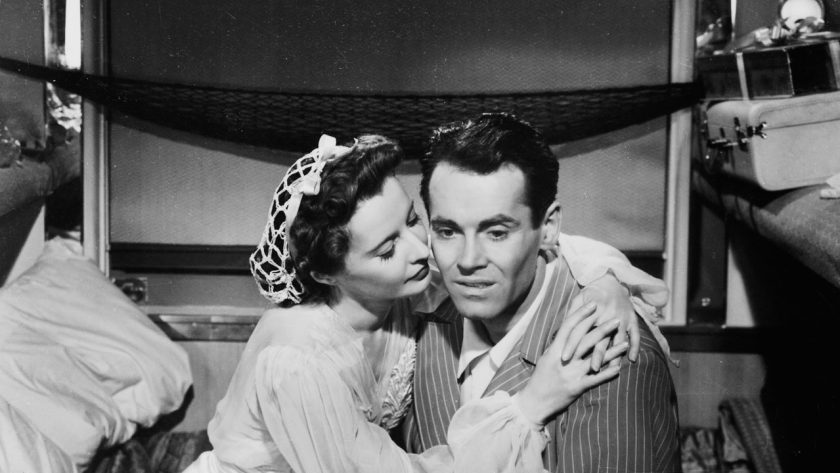If you can believe it, there are even fewer good movies genuinely set on Valentine’s Day than there are on not-exactly-movie-genic holidays Thanksgiving and New Year’s. Maybe it’s because of the ways courtship (and therefore both romantic movies, and the holiday itself) changed over the course of the 20th Century, or maybe because—unlike setting a romantic movie over Christmas—placing your romantic comedy or drama specifically on Valentine’s Day feels too much like a hat on a hat. In contemporary times, maybe the vicious one-two punch of I Hate Valentine’s Day (2009, Nia Vardalos) and Valentine’s Day (2010, Garry Marshall) scared filmmakers off the date for good. Of course, there are plenty of romance movies that will do the trick as Valentine’s Day movies —so many, in fact, that sifting through all of them can become overwhelming even before you take into account the flood of options available at the click of a button across so many streaming channels.
The upside is that within that flood, you may be able to find a romantic movie for whatever sub-mood you’re in – and that movie could even be a great one, if you follow this handy guide. Because the aim here is not just to find you a good-enough rom-com to inspire a halfhearted press of “play” once you and your date/partner/hookup are too tired to keep searching. No, let’s get you a couch-date movie (or, if you’re lucky enough to have a varied and semi-adventurous rep scene, outside-world-date movie) that’s truly, cinematically excellent.
The following thirteen romances attempt to avoid the blatantly lopsided, the overtly problematic, and the movies where you have to just go with it to get to the kissing. Not because it’s wrong to enjoy a lopsided, problematic, age-gapped, power-imbalanced, potentially unhealthy just-get-to-the-kissing romance, of course—some of the best romantic movies ever made fit that description. But you also deserve a romantic night at the movies—whether wholly delightful or bittersweet—without an asterisk like “it’s great if you half-ignore Andie MacDowell.” Plus, I’m assuming you’ve seen, or at least understand that you should see, bona fide all-time classics like It Happened One Night or The Philadelphia Story. As such, nothing from the AFI Top 100 will be included here. (Some of them are on the more specialized AFI 100 Passions list, because otherwise that’s a lot of passions to dismiss.)
Some of these are wholly comic, some of them are deeply sad, and some of them (well, one of them) involves potential murder via giant cat—which is to say, there’s something for almost any film fan. A few of them even take place on or around Valentine’s Day.
In the mood for screwball love: My Man Godfrey (1936)
The influence of screwball comedies on modern rom-coms is so pervasive that it’s also become watered-down over the years, so a straight shot of the real thing can be bracing. My Man Godfrey has a romance between a down-on-his-luck “forgotten man” (William Powell) and the well-meaning younger daughter (Carole Lombard) of a rich family, but it’s less of a romance than the likes of His Girl Friday or The Philadelphia Story (and, not to be unkind, a bit more sophisticated than the animal antics of Bringing Up Baby), while still serving up a delightful romantic give-and-take en route to a happy ending. My Man Godfrey has everything you want out of a Depression-era screwball rom-com: Hoovervilles, flighty rich people, short-suffering butlers, dizzy infatuation, and escape from economic despair. In a perfectly screwy touch, Powell and Lombard were married—but split up years before making the movie together.
In the mood for larcenous love: The Lady Eve (1941)
Aren’t a lot of relationships built on some sort of con or another? The Lady Eve, a gem from Preston Sturges, simply makes that explicit, as con woman Jean Harrington (Barbara Stanwyck) targets Charles Pike (Henry Fonda), only to fall in love with him—and then, when he gets wise to her initial scheme, attempts revenge via an even more outlandish plot. Stanwyck often played tougher and/or sultrier roles than more frequent rom-com performers, which makes her commitment to her character’s criminal lifestyle in The Lady Eve both more believable and even funnier. For that matter, the star of The Ox-Bow Incident and Young Mr. Lincoln doesn’t exactly scream “zany,” either, yet Fonda pairs perfectly with Stanwyck in this fast-paced and ultimately pretty sexy material. This, too, makes sense: Acting can also be a beautiful con. (Sturges was on a roll here; his screwball rom-com from the following year, The Palm Beach Story, is also terrific.)
In the mood for scary love: Cat People (1942)
You could make a whole list of gothic and monster-related love stories, but Cat People deserves a nod for the degree to which it allows love, lust, and animal instinct to intertwine—all in a story that centers a shapeshifting woman (Simone Simon) who lives in fear of being overtaken by her fearsome desire. Now that the idea of a “cat lady” has been introduced, popularized, and in some cases reclaimed by the culture at large, the idea of a woman who becomes a cat—untamed by mere marriage, stalking and attempting to destroy her perceived romantic rivals—has only gotten kickier and more subversive. 40 years later, in 1982, the demise of the production code and the existence of Paul Schrader would make possible an even-lustier remake, complete with a killer David Bowie theme song. And for that matter, Michelle Pfeiffer’s definitive big-screen Catwoman in Batman Returns probably owes more than a little to this Val Lewton classic as well.
In the mood for adventurous love: Charade (1963)
OK, I lied about the age-gap thing: This is one. Look, it’s damn hard to find a charming Audrey Hepburn romance that doesn’t pair her with a significantly older leading-man star of slightly before her time, whether it’s Fred Astaire in Funny Face, Rex Harrison in My Fair Lady, or Gregory Peck in Roman Holiday. (She’s perfectly age-matched in Breakfast at Tiffany’s, but that one is really more of a solo showcase for her than it is a transporting romance.) At the same time, it’s damn harder to not include one of Hepburn’s sparkling old-guy chemistry experiments, so let’s make do with a gracefully aged Cary Grant, in a movie that makes the most of their generational gap, as Grant plays a charming man who’s hard to pin down; his identity keeps shifting as he helps her through a money-chasing caper caused by the murdered husband she was planning to divorce. There are a lot of fantasies, on screen and in life, about people getting swept off their feet; even as a Hitchcock-lite-style entertainment (the actual director is regular Hepburn collaborator Stanley Donen), Charade understands how the potential disorientation can and should be part of the fun.
In the mood for decades-spanning love: The Way We Were (1973)
Many of the most famous big-screen love stories of the 1970s tend to be sadder and more self-consciously weightier than their more effervescent counterparts from the 1950s and 1960s. The Way We Were is straight melodrama, but its long-range romance, following the ups and downs of a try-hard (Barbra Streisand) and a golden boy (Robert Redford), has surprising weight—maybe because it’s only in retrospect that their relationship looks like one long breakup that neither of them are fully committed to executing. Hollywood romances love to show people overcoming their differences in personality, background, and/or life goals to simply make it work by sheer force of narrative will. So it’s a little jarring, yet maybe also weirdly comforting, to watch a pair of megawatt stars ultimately unable to do.
In the mood for young love: Say Anything (1989)
Here’s a little secret about John Hughes: A lot of his celebrated teen movies are romantic comedies, and a lot of them, to use some probably-outdated teenage parlance, suck ass. Obviously that’s an oversimplification, but as romantic comedies, it’s hard to compare a movie like Pretty in Pink to one like Cameron Crowe’s Say Anything, an unusually perceptive and well-balanced love story between the class brain “Diane Court, whoa” (Ione Skye) and the earnest, persistent eccentric Lloyd Dobler (John Cusack), a good-hearted teenager who doesn’t want to buy anything sold or processed (and so forth) as a career. It’s hard to make a good love story about teenagers on the verge of graduating high school, because does anyone ever really believe that they’re going to stay together longer than a few more months? Say Anything is about those very doubts, which it exacerbates by playing up Lloyd and Diane’s differences, before chasing them away with a final shot that’s like an optimist’s flip of The Graduate—a romantic gesture no one ever knew they needed until Crowe cooked it up.
In the mood for cross-cultural love: Mississippi Masala (1991)
Mira Nair’s tender, sexy romance is about Mina (Sarita Choudhury), an Indian-American who feels at home in her Mississippi community, falling in love with Demeterius (Denzel Washington), a local charmer whose Blackness bothers Mina’s parents (just as his family resists his interest in an Indian-American girl). But it’s also about forging a complicated relationship between your heritage and your day-to-day life as it’s actually lived, and whether those aspects of yourself can be reconciled. If it sounds heady, keep in mind how absolutely smoking hot Choudhury and Washington are—and how Nair has a talent for teasing these conflicts out from a sense of place that’s too rare in glossy movie romances.
In the mood for costumed, bittersweet love: Shakespeare in Love (1998)
For years it took undeserved flak for beating out Saving Private Ryan in the Best Picture category at that year’s Academy Awards, a kind of manufactured boys-like-this/girls-like-that conflict entirely unfair to a movie that deserved more love for bringing the oft-disreputable rom-com genre to the top Oscar for the first time since Annie Hall. Granted, Shakespeare in Love has the costume-heavy biopic angle, but, gloriously, the biography is entirely made up, with Joseph Fiennes playing a tortured artist who lights up at the sight of his temporary muse (Gwyneth Paltrow). Their final scene together is one for the ages.
In the mood for musical love: Moulin Rouge! (2001)
It’s genuinely sort of difficult to find a musical without some sort of accompanying love story, but Moulin Rouge! has perhaps the least perfunctory musical love story of all time, because its entire reason for being is wrapped up in trying to communicate passionate, heedless, ridiculous love through song—in making the act of bursting into song seem revolutionary in its boldness and noble in its honesty. Ewan McGregor and Nicole Kidman, perfectly matched as performers whose acting-first ability to emote openly informs their nonprofessional but deeply charming singing, lead an uncynical hit parade, frequently turning dross into gold. They capture what it feels like for a pop song (even or especially one that’s kind of stupid) to leap into your (stupid) soul. Baz Luhrmann stages every musical number with a phantasmagorical understanding of the overlapping language of film, theater, pop music, and music video—a reminder that you can fall in love with forms as well as people.
In the mood for science-fiction love: Eternal Sunshine of the Spotless Mind (2004)
“Today is a holiday invented by greeting card companies to make people feel like crap.” It wasn’t an original sentiment 20 years ago, yet it opens probably the best Valentine’s Day movie ever made, as Joel (Jim Carrey) boards a train to Montauk on February 14th. There he meets Clementine (Kate Winslet) for the first time—or does he? Michel Gondry and Charlie Kaufman’s tricky sci-fi classic about a firm that offers to erase people from each other’s memories recontextualizes the stormy Joel/Clementine relationship throughout the movie. By the end, the film’s Valentine’s Day opening will strike you as deeply romantic, frighteningly doomed, or gently hopeful, depending on where you’re coming from. It’s the perfect sci-fi romance, where big what-if questions about humanity are inseparable from intimate questions about our relationships—and equally unanswerable.
In the mood for honest love: Obvious Child (2014)
When Donna (Jenny Slate), a stand-up comic reeling from a break-up, gets pregnant from a one-night rebound, she seeks out an abortion. The clinic has two available dates: her mom’s birthday, and Valentine’s Day. She chooses Valentine’s Day, which instantly throws Gillian Robespierre’s comedy into the top tier of movies set at least in part on the actual holiday. But Obvious Child doesn’t register as a performatively anti-Valentine’s provocation; it’s just a movie where a woman gets an abortion, and the real obstacles between her and a potential love interest come from herself, not her procedure. As a rom-com with a shot of genuine strife, Obvious Child has a terrific command of its small scope, paying particular attention to the rocky, fumbling early days of a relationship, and preserving whatever comes next for the characters to discover themselves.
In the mood for questioning love: Straight Up (2020)
Circling back to screwball for a more contemporary sensibility: This precisely staged and rapid-fire indie concerns a slightly squeamish young man (writer-director James Sweeney) who has always assumed he was gay embarking upon a not-quite-platonic relationship with a sardonic young woman (Katie Findlay) who’s fine with a chaste, experimental form of romance. Rather than constructing an uncomfortable conversion narrative or a dorm-room thought experiment, Sweeney comes up with a gently pressing, and at times achingly funny, investigation into sexuality, identity, and flexibility, all orchestrated with a dazzling eye for blocking, a keen ear for banter, and enormous sensitivity from the two leads, who carry multiple long two-hander scenes so deftly that they feel romantic—whether or not sex enters the picture.
Bonus selection for those not remotely in the mood: Valentine (2001)
There are a lot of holiday-themed horror movies, many of them winkingly cynical, but it’s rare to find one so thoroughly poisonous without a particular satirical target in mind. Valentine was the last gasp of first-wave Scream imitators, and as a slasher-centric murder mystery, it’s slickly unscary and nonsensical. As a demented piece of turn-of-the-century sociology, however, it is invaluable. It follows the ramifications of sixth-grade bullying into purported adulthood, as a spurned geek appears to be picking off a group of middle-school besties one by one. All of these supposed twentysomethings (including Denise Richards and future rom-com queen Katherine Heigl) are written as if by sixth-graders imagining grown-up life, where people with full-time jobs and apartments still attend Valentine’s Day parties at the rich girl’s house. Coexisting with this bizarre playacting is a more adult (if still inarticulate) sense of romantic dissatisfaction, placing the characters in an endless and grotesque meat-market hell of misplaced male intensity – and that’s before they start getting stabbed to death. Nia Vardalos may cutely claim to hate Valentine’s Day, but this is the V-Day picture with true loathing in its heart.



